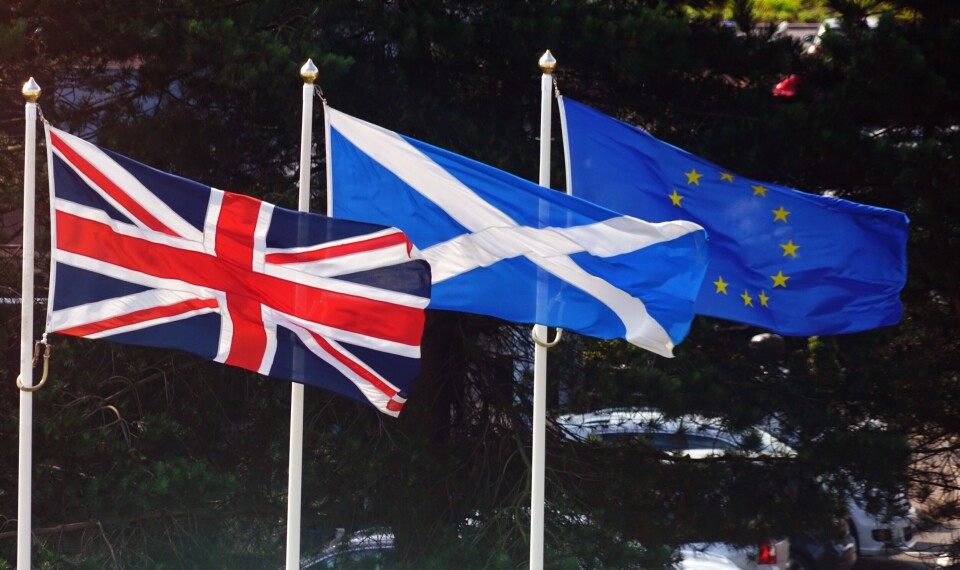-
Why calls for Emmanuel Macron to resign as president of France are misguided
The president should stay put, argues columnist Nick Inman
-
Readers report high customs charges on gifts sent to France
The cost of receiving gifts is sometimes higher than their value
-
France’s proposed voluntary national service: military revival or costly misstep?
Concerns have emerged over scheme's potential overlap with the recently abandoned Service national universel
‘Brexit made Scottish independence and EU re-entry more likely’
Experts in Scotland talk to The Connexion’s Thomas Brent about how Brexit impacts a second independence referendum and why rejoining the EU will take time

Experts agree that Brexit has only made Scottish independence more likely but EU re-entry would take time,
Scotland will probably hold another independence referendum within the next decade, two political analysts have said, paving the way for the country to rejoin the European Union (EU).
They warn there will not necessarily be any special shortcuts and several factors could change the dynamic of an EU membership bid, such as participation in the eurozone, approval from other EU member states and the UK government’s stance.
EU membership process would still be followed
Anthony Salamone, political scientist and managing director of Edinburgh-based analysis firm European Merchants, said that if Scotland did gain independence from the UK, it would take another four to five years to complete EU accession.
“It does not really matter that Scotland used to be part of the EU through the UK. There are procedures that have to be followed,” he said.
“However, I think Scotland would be very well qualified to not only go through and complete the membership process but to do it faster than normal.”
Full independence from UK needed first
He added that if Scotland did vote to split from the UK, it would not be able to seek EU membership until it was fully independent with its own institutions, a process that could itself take some time.
However, he suggested it might be possible for Scotland to negotiate a special ‘closer association agreement’ in that period, which would set out the future relationship between Scotland and the EU, including its participation in the single market and customs union.
“It would be unique. It has never been done before and it would require all EU member states agreeing to it, as well as the UK government.”
‘Betrayed’ by independence and Brexit campaigns
The Scottish public voted 55% to 45% to remain part of the UK in a 2014 referendum.
A major element of the Better Together campaign, which advocated against Scotland leaving the UK, was the warning that if it left, it would lose its EU membership status.
Two years later, the UK voted to leave the EU, despite a majority of voters in Scotland, 62%, voting to remain.
Many in Scotland felt betrayed and Nicola McEwen, a professor at the University of Edinburgh and senior research fellow at the thinktank UK in a Changing Europe, said this has strengthened Scotland’s affinity for the EU.
“There is now a much stronger relationship between support for independence and those who want EU membership,” she said.
“Those elements are much closer aligned than they were before Brexit.”
Spain worried about Scottish precedent
Some commentators suggest that Spain, which has its own secession issues, namely that of Catalonia, might try to block Scotland’s reintegration into the EU so as not to encourage Catalonian separatists.
Prof McEwen said this was unlikely as long as Scotland achieved independence through legal means.
“The Scottish government is always very careful not to draw parallels with the Catalonia situation,” she said.
“Scotland will try to establish independence legally. I do not see any other way that it could, or would, want to become independent.
“Nicola Sturgeon, Scotland’s First Minister, has been quite clear about that.”
Currency question
Another obstacle could be which currency Scotland would opt for – a factor that dissuaded some from backing independence in 2014.
Mr Salamone said this question remains largely unresolved. “It is hard to tell to what extent people in Scotland would support joining the euro,” he said.
“The main question generally asked about it is: ‘Would Scotland be forced to join the single currency?’
“This implies people do not want to, but I do not think that is necessarily the case.
“It is an instance of the London-centric Eurosceptic argument being transferred over to Scotland, despite the fact most people here were not in favour of Brexit.
“So, we have a dysfunctional debate on currency at the moment.
“However, it is very clear that the European Commission and other bodies are not intent on forcing any country to join the euro if it does not want to, or feel ready to.
“I think Scotland would need to make a general political statement that it was willing to join the euro, but in practice could join it in a very long time or never, depending on what people in Scotland wanted to do.”
Border issues would depend on relationship between EU and Westminster
Further complications could arise from the border that would have to be established between Scotland and England should there be independence.
“It is complex, but it depends very much on what relationship the UK has with the EU if (and it is a big ‘if’) Scotland does back independence,” Prof McEwen said.
“The UK’s relationship with the EU is not something that is stable. If there was a change of government and Labour got in, for example, it is difficult to imagine the UK government would want to keep relations exactly the same as they are now.
“So the border question could change a lot.”
Before Scotland can even think about rejoining the EU, though, another referendum would need to take place, something both analysts feel is likely.
“It is the dominant issue in Scottish politics,” Prof McEwen said. “It feels like an issue that has to be resolved.”
Related articles
Brittany votes to ask for autonomy from France after Corsica statement
Votes for life for Britons abroad: ‘I’d use mine to reverse Brexit’
French couple’s detective work reunites stolen bag with Scottish owner
























